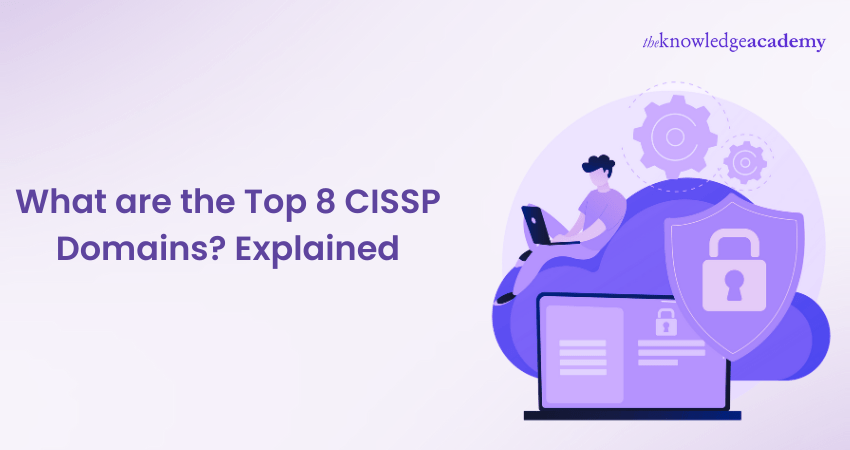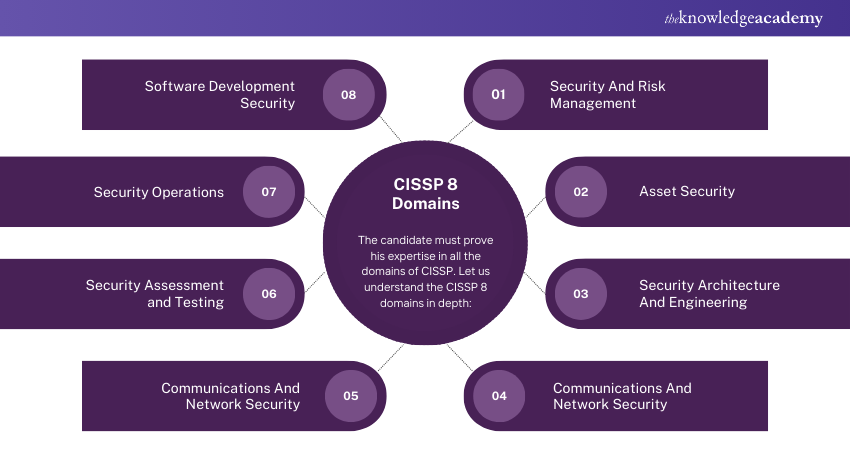We may not have the course you’re looking for. If you enquire or give us a call on 01344203999 and speak to our training experts, we may still be able to help with your training requirements.
Training Outcomes Within Your Budget!
We ensure quality, budget-alignment, and timely delivery by our expert instructors.

Conquering the CISSP Exam is a coveted achievement for Cybersecurity professionals. But the eight CISSP Domains it covers can seem daunting at first. These domains cover a broad range of topics, from security and Risk Management to Software Development security and incident response. Mastering these domains equips you with the expertise to effectively design, implement, and oversee an organisation's Cybersecurity posture.
Given the importance of these domains, if you are looking to pass the CISSP Certification exam, it is the right time to get familiar with these essential guidelines. So, wait no more and read this blog. This blog is your one-stop guide to understanding these CISSP Domains. We'll break down each domain in detail, explaining the key concepts and their relevance to Information Security. Delve in to learn more!
Table of Contents
1) What is CISSP?
2) Prerequisites and exam qualifications for CISSP Certifications
3) CISSP Domains – Detailed overview
4) Conclusion
What is CISSP?
Certified Information Systems Security Professional (CISSP) is one of the most widely accepted Information Security certifications that recognises the professional who have various levels of expertise in Cybersecurity. This CISSP professional has a deep configuration and management knowledge and experience of the security architecture of the organisation.
The International Information System Security Certification Consortium (ISC)² is a non-profit consortium organised to develop and preserve the CISSP Domains and uses them for the conducting of exams worldwide.The eight Domains in CISSP CBK are grouped around every major aspect of Information Security.
To be certified, a candidate has to show required skills in all domains of this certification. Periodic CISSP renewal will make it sustainable in a firmly growing environment of Information Security. They need to show not only their excellence in each different Cybersecurity elements, but also their competencies in systematically applying this knowledge and applying it either in CISM or CISSP.

Prerequisites and exam qualifications for CISSP Certifications
The following are the Prerequisites and exam qualifications for CISSP Certifications:
Prerequisites of CISSP
Let us go through the requirements for you to become a CISSP Certified professional.
To apply for the CISSP Exam, the candidate must possess five years of work experience in information security. Have two of the eight (ISC)² CISSP security domains in their work experience (CBK).
You may be permitted for one-year remission/cancellation of the professional experience requirement if you possess at least one of the following benchmarks:
1) You graduated from a four-year college.
2) You hold an academic degree with honours from the National Center of Academic Excellence in Information Security.
3) You have a certification from the (ISC)² -approved list, such as - Microsoft Certified Systems Engineer (MCSE), Certified Information Systems Auditor (CISA), and CompTIA Security+.
Irrespective of possessing two or more categories from the above list (For example, College degree + MCSE/CISA), you are eligible for one year of remission from the five-year professional experience requirement. CEH vs CISSP, the dynamic duo of cybersecurity certifications, highlights the exceptional expertise.
Examination Plan of Action
Currently, the pass rate of CISSP is approximately 20%, and the minimum passing percentage is 70%. For this reason, you must get a minimum passing score of 700 out of 1000 to clear the CISSP Exam. The exam proceeds with 250 questions from the eight domains with a set time of 6 hours. The present updated cost of the CISSP Exam varies by country, contrasting with previous pricing structures
This CISSP Linear Exam pattern comprises a combination of Multiple-choice questions and Advanced thought-provoking questions. The CISSP Linear Exam is available in Chinese, German, Japanese, Korean and Spanish.
The candidates appearing for the CISSP CAT Common Body of Knowledge (CBK) exam will be assessed on CISSP 8 domains. The four-hour CISSP exam consists of 125 - 175 multiple-choice and innovative questions. The candidate must score at least 70% on the test to succeed. The passing score is 700 out of 1000 points, leading to a few debates on how challenging it is to pass the exam. The language availability for CISSP CAT Exams is only English.
Underlining the vital issues that cybersecurity professionals face, the CISSP is revised a few times to include recommended practices to mitigate the flaws.
Upgrade yourself with Chief Information Security Officer Training Now!
CISSP Domains - Detailed overview
The candidate must prove his expertise in all the Domains of CISSP. Let us understand the CISSP 8 Domains in depth:

1) Security and Risk Management
1) The CISSP Exam weighs up around 15% on average. This CISSP Domain consists of most of the content, providing you with an overview of the information systems management you need to know. It comprises of the following:
2) Understand professional ethics
3) Security governance principles and concepts
4) Compliance and other requirements
5) Understanding legal and regulatory issues in the context of Information security
6) Personnel security policies and procedures
7) Risk-based management concepts
2) Asset Security
This CISSP Domain focuses on data protection, management and safety controls. The content picked from here is roughly 10% for the CISSP Exam. It includes the abilities of many jobs about data management, information ownership & processing, privacy concerns, and limitations. It includes the following:
1) Data lifecycle management
2) Data security controls and compliance
3) Data privacy & safeguarding
4) Information and Asset Retention
5) Compliance requirements
3) Security Architecture and Engineering
Security Architecture and Engineering address up to 13% of the CISSP Exam. Numerous CISSP significant concepts and information about security are covered in this sector which include the following:
1) Research, implement and manage engineering processes using secure design principles
2) Understanding the fundamental concepts of security models
3) Understanding security capabilities and controls based on security requirements
4) Assessing and mitigating vulnerabilities in security systems
5) Methods of Cryptanalytic attacks
6) Designing and facilitating security controls
4) Communications and Network Security
This CISSP Domain implicates multilayer protocols to establish and maintain network security. It includes about 13% of the content for the CISSP Exam. It instructs on the capacity to build trustworthy network security and communication channels.
The questions on communication networks, diverse network design characteristics, media transmission, and wireless communications will be conferred to the candidates appearing in the exam. Communications and Network security includes -
1) Assessing and implementing secure design principles
2) Protecting network components
3) Methods to implement secure communication channels.
5) Identity and Access Management
The Identity and access management domain includes about 13% of the content in the CISSP Exam. This domain aids Information Security professionals in better understanding how to limit users' access to data information. It comprises of the following:
1) Methods to control physical and logical access to assets
2) Identification and authentication of people, devices, and services.
3) Centralised third-party identification service
4) Implement authentication systems
5) Identity and access provisioning lifecycle

6) Security Assessment and Testing
This CISSP Domain covers the methods and tools used to evaluate the security of processes and identify flaws and errors in layout or code, vulnerabilities, and potentially dangerous regions that rules and systems are unable to address. It comprises roughly 12% of the CISSP Exam. Security testing and assessment include:
1) Disaster recovery
2) Awareness training for clients
3) Vulnerability assessment and penetration testing
4) Business continuity plans
7) Security Operations
1) Understand and abide by investigations
2) Configuration Management
3) Logging and monitoring activities
4) Securing resources
5) vulnerability management
6) Apply foundational security operations concepts
7) Applying resource protection techniques
8) Conduct Incident management
9) Implement and test a disaster recovery
10) Manage and Implement personnel safety and security
11) Planning Business continuity
8) Software Development Security
This topic covers CISSP security operations, involving about 11% of the content in the CISSP Exam. Software Development Security conducts a detailed study of software security systems comprising the following:
1) Security integration in the Software Development Life Cycle (SDLC)
2) Detect and apply security controls
3) Assessing software's security impact
4) Apply secure coding guidelines and standards
Enhance your Cybersecurity skills with our Information Systems Security Management Training. Join now!
Conclusion
In this blog post, we have covered almost everything relevant to CISSP Certifications and the top 8 (ISC)² CISSP Domains that cover the comprehensive aspects of information security. We have also covered the CISSP Exam qualifications and prerequisites for candidates to appear for this certification.
Are you interested in setting up a career in IT/IS Security? Then, this CISSP Training is for you.
Frequently Asked Questions

The CISSP domains are vital as they provide a structured framework for understanding and addressing key aspects of information security. Mastering these domains demonstrates proficiency in critical areas, enhancing job prospects and equipping professionals to safeguard organisations from cybersecurity threats effectively.

There is no specific limit on the number of times one can attempt the CISSP exam. However, candidates must wait 30 days between attempts. After the fourth attempt, candidates must wait 180 days before trying again.There is no specific limit on the number of times one can attempt the CISSP exam. However, candidates must wait 30 days between attempts. After the fourth attempt, candidates must wait 180 days before trying again.

The Knowledge Academy takes global learning to new heights, offering over 30,000 online courses across 490+ locations in 220 countries. This expansive reach ensures accessibility and convenience for learners worldwide.
Alongside our diverse Online Course Catalogue, encompassing 17 major categories, we go the extra mile by providing a plethora of free educational Online Resources like News updates, Blogs, videos, webinars, and interview questions. Tailoring learning experiences further, professionals can maximise value with customisable Course Bundles of TKA.

The Knowledge Academy’s Knowledge Pass, a prepaid voucher, adds another layer of flexibility, allowing course bookings over a 12-month period. Join us on a journey where education knows no bounds.

The Knowledge Academy offers various CISSP Trainings, including CISSP Certification Course, Information Systems Security Management Training and more. These courses cater to different skill levels, providing comprehensive insights into CISSP Certification.
Our IT Security & Data Protection Blogs cover a range of topics related to CISSP, offering valuable resources, best practices, and industry insights. Whether you are a beginner or looking to advance your CISSP skills, The Knowledge Academy's diverse courses and informative blogs have you covered.
Upcoming IT Security & Data Protection Resources Batches & Dates
Date
 CISSP Certification
CISSP Certification
Mon 13th May 2024
Sat 18th May 2024, Sun 19th May 2024
Mon 3rd Jun 2024
Sat 22nd Jun 2024, Sun 23rd Jun 2024
Mon 1st Jul 2024
Sat 20th Jul 2024, Sun 21st Jul 2024
Mon 5th Aug 2024
Sat 17th Aug 2024, Sun 18th Aug 2024
Mon 2nd Sep 2024
Sat 21st Sep 2024, Sun 22nd Sep 2024
Mon 7th Oct 2024
Sat 19th Oct 2024, Sun 20th Oct 2024
Mon 21st Oct 2024
Mon 4th Nov 2024
Sat 16th Nov 2024, Sun 17th Nov 2024
Mon 18th Nov 2024
Mon 2nd Dec 2024
Sat 14th Dec 2024, Sun 15th Dec 2024
Mon 16th Dec 2024







 Top Rated Course
Top Rated Course


 If you wish to make any changes to your course, please
If you wish to make any changes to your course, please


